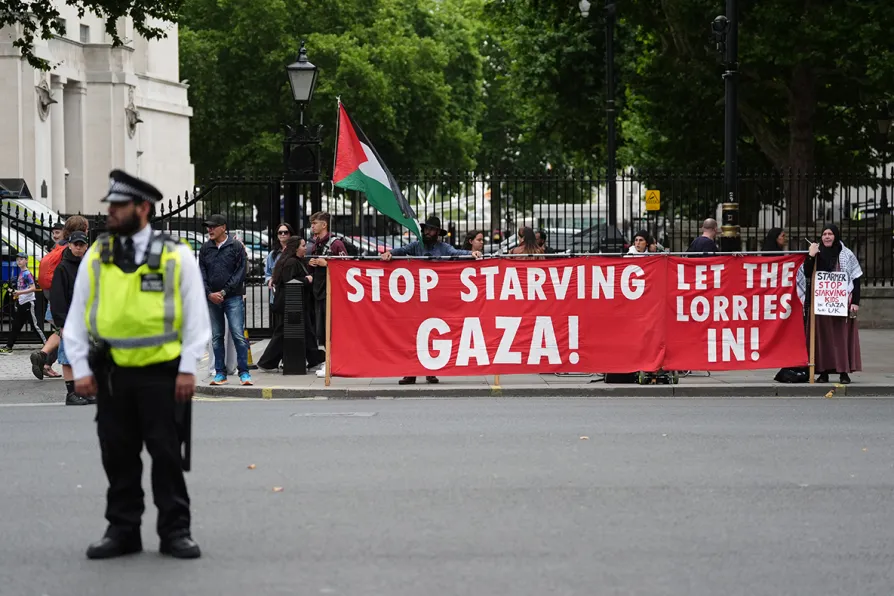Error message
An error occurred while searching, try again later.
 People take part in a protest outside Downing Street in London, as Prime Minister Sir Keir Starmer gathered senior ministers for an urgent Cabinet meeting on Gaza, July 29, 2025
People take part in a protest outside Downing Street in London, as Prime Minister Sir Keir Starmer gathered senior ministers for an urgent Cabinet meeting on Gaza, July 29, 2025
KEIR STARMER is on the ropes — again — and because of Palestine.
The government’s proposal to recognise the state of Palestine if Israel does not implement a ceasefire in Gaza is a concession. Motivated by the escalating clamour from Labour MPs for Britain to join the three-quarters of countries worldwide which recognise Palestine, which is in turn the result of the sustained pressure of the streets. The giant national demos, the countless local actions, the ever rising indignation every MP feels from their constituents at Britain’s role in televised mass murder by the Israel Defence Forces.
In that sense it is welcome. But it is also very likely empty. Israel has agreed to, then arbitrarily broken, ceasefires before: it did so in the first few months of this year, before breaching the peace without warning with its most savage bombing raids yet, incinerating hundreds of Palestinians a night. If it needs to pause because of external pressure, it will: that does not prevent it from resuming its genocidal onslaught whenever the pressure recedes.
Offers to recognise Palestine are issued in a framework of threatening Israel, rather than recognising the Palestinian right to self-determination they were promised themselves when their land was partitioned to create Israel.
This itself reiterates the colonial supremacist mindset that has permitted the denial of Palestinian national rights since the 1940s: their right to exist as a people is contingent on the agreement of their coloniser, and is now wielded as a stick to try to persuade that coloniser to tone down the killing to a level that Starmer can ignore.
So those saying Britain should unconditionally recognise Palestine are right. As a state, it would be harder for Israel to erase. It would also make debates about a two-state solution, whatever one’s view of it, more concrete, and open up more avenues in this country to challenge Israel’s illegal occupation of internationally recognised Palestinian land.
At the same time, it is a non-concession. It is an offer to do something in the future, based on a demonstrably dishonest government’s agreement to a temporary pause in operations.
Genocidal shills in major British media outlets still croak that Israel is not trying to conquer land, or exterminate people, but merely seeking the defeat of Hamas, which attacked it in October 2023. They have no credibility at all: Israeli ministers have gleefully embraced US President Donald Trump’s proposal to empty Gaza of its natives, and routinely defend the killing of civilians and artificial mass starvation in the most explicit terms.
The myth that Israeli aggression is some sort of “self-defence” carries less conviction by the week. So the proper response to Starmer — who is only trying to buy himself a respite from public pressure on Palestine — is to use his concession to extract something tangible.
Your government claims to support a two-state solution, and has issued this warning to Israel in that context. So address the ways in which Israel is making that prospect unviable. Ban imports from the occupied territories. End all arms exports and apply sanctions, not pending a ceasefire, but pending the full withdrawal of Israeli troops from UN-recognised Palestine: a retreat to its 1967 borders.
You say Israel’s war crimes in Gaza are creating an unacceptable situation: so stop trying to harass, persecute and imprison the decent people moved to stand up and protest at your government’s complicity in that, which — not just through sales but surveillance co-operation, supplies and training of IDF soldiers — facilitates the crimes you condemn. Don’t await the courts, repeal the outrageous ban on Palestine Action and stop threatening the BBC for documentaries and festival footage that offend Israel.
Starmer is on the back foot, but unless we press this home it will count for nothing in Gaza. We have much more to do.










